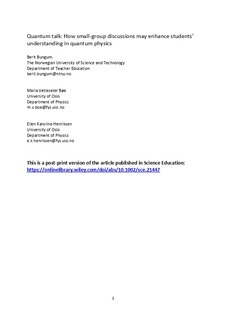Quantum Talk: How small-group discussions may enhance students’ understanding in quantum physics
Journal article, Peer reviewed
Accepted version

Åpne
Permanent lenke
http://hdl.handle.net/11250/2594723Utgivelsesdato
2018Metadata
Vis full innførselSamlinger
- Institutt for lærerutdanning [3729]
- Publikasjoner fra CRIStin - NTNU [38294]
Sammendrag
Quantum physics challenges our views of the physical world anddescribes phenomena that cannot be directly observed. The useof language is hence essential in the teaching of quantum physics.With a sociocultural view of learning, we investigate characteristicsof preuniversity students’ small-group discussions and their poten-tial for enhancing understanding of quantum physics. The empiricaldata are 96 small-group discussions about two fundamental dilem-mas: whether light can be both waves and particles, and whetherthe cat in Schrödinger's thought experiment can be considered tobe both dead and alive. The discussions were analyzed by means ofa framework of four categories, grouped as productive and nonpro-ductive for learning, where “productive” means that students buildconstructively on each other's utterances and take the peers’ ideasinto account. Results show that a total of 70% of the discussions wereproductive, indicating that small-group discussions have a potentialfor enhancing understanding in quantum physics. This potential isconstituted by leading students to (i) articulate conceptual difficul-ties, (ii) deepen their understanding through exchange of views, and(iii) formulate new questions. The paper concludes with a discussionon how the learning potential of small-group discussions may be real-ized by combining dialogic and authoritative approaches.